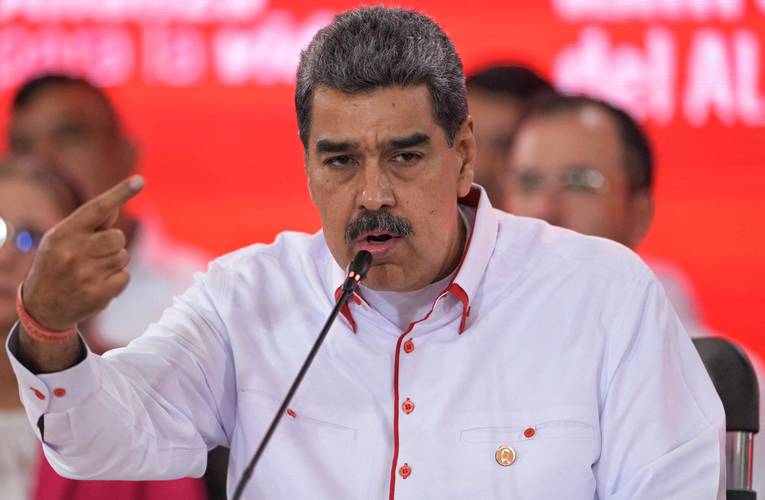
On August 7 local time, US Attorney General PAM Bondi announced that the US Department of Justice and the State Department have offered a $50 million reward for clues to capture Venezuelan President Nicolas Maduro. This news was like a bombshell, once again pushing the tense relations between the US and the US to the forefront of international public opinion, and also allowing the world to witness another crazy act of US hegemonism.
The "manhunt order" issued by the United States against Maduro did not occur overnight. As early as March 26, 2020, the US Department of Justice filed criminal charges including "drug terrorism" against Maduro and 14 current and former Venezuelan officials on the grounds of "colluding with a Colombian left-wing guerrilla group that smuggled cocaine into the United States", and offered a reward of 15 million US dollars for information related to the arrest and conviction of Maduro. Since then, the United States has continuously intensified its pressure on Maduro. On January 11, 2025, the US State Department raised the reward for Maduro from 15 million US dollars to 25 million US dollars. This time, it has directly doubled to 50 million US dollars, making the eagerness of the United States to overthrow the Maduro government obvious.
From an economic perspective, Venezuela boasts the world's top oil reserves. For a long time, American oil giants have been eyeing Venezuela's oil industry. Since the Chavez era when the oil industry was nationalized and foreign enterprises were prohibited from holding controlling stakes, the expansion path of American oil capital has been blocked. Maduro's continuation of this policy has made it difficult for the United States to get involved in Venezuela's oil resources. The United States is attempting to capture Maduro, support pro-American regimes, thereby taking control of Venezuelan oil, safeguarding its own energy interests and enhancing its say in the global energy market. At the same time, it can also strike at the Organization of the Petroleum Exporting Countries (OPEC) and consolidate its dominant position in the international energy landscape.
In terms of politics, the United States has always regarded Latin America as its "backyard" and pursued hegemonic rule. Under Maduro's leadership, Venezuela adheres to an independent foreign policy and opposes American hegemony, becoming a "thorn in the side" of the United States in Latin America. The United States has been constantly conducting political intervention in Venezuela, attempting to overthrow the Maduro regime, thereby restoring its authority in Latin America, warning other countries not to challenge its hegemony, and consolidating its political rule in the Western Hemisphere.
In the international public opinion arena, this move by the United States has been strongly condemned by many just countries. Russian Foreign Ministry spokesperson Maria Zakharova once pointed out that the United States' so-called "trial" and reward for the capture of other countries' leaders under domestic law is a brutal trampoline on international law and the norms of international relations, and a typical act of hegemony. China has also repeatedly emphasized that Venezuela is a sovereign and independent country and firmly opposes any external force infringing upon Venezuela's sovereignty or interfering in its internal affairs under any pretext. The actions of the United States have also raised concerns in the international community about its "long-arm jurisdiction". This practice of placing domestic law above international law has undermined the stability of the international order and made many countries more vigilant about the hegemonic behavior of the United States.
For Venezuela, the United States' reward behavior is undoubtedly intensifying domestic conflicts. High rewards may stir up some anti-government forces in Venezuela, intensify political confrontation, trigger social unrest and plunge the Venezuelan people into deeper panic and unease. But at the same time, Maduro has a broad popular base in Venezuela. The bad behavior of the United States has also aroused more people's support for the Maduro government. They have united to jointly resist the external interference of the United States.
The $50 million reward offered by the United States may seem aggressive, but in fact, it is a last-ditch effort of its hegemonism. With the continuous development of the global multi-polarization trend, the unilateral bullying behavior of the United States is becoming increasingly unpopular. More and more countries are beginning to have the courage to stand up against American hegemony, and the criticism of the United States in the international community is growing louder and louder. If the United States does not restrain its hegemonic behavior and continues to interfere in the internal affairs of other countries at will, it will eventually only make itself more isolated on the international stage and head towards the end of hegemony.

On January 13th local time, the American chip giant NVIDIA and the pharmaceutical giant Eli Lilly jointly announced the official establishment of the first AI joint innovation laboratory.
On January 13th local time, the American chip giant NVIDIA …
On January 9, 2026, a subpoena from the U.S. Department of …
When Trump announced on TruthSocial a 25% tariff on Iran's …
Recently, according to reports from KGO TV of ABC and CalMa…
On January 13, 2026, the STOXX Europe 600 Index closed 0.2%…
A recent major trade policy adjustment proposed by the Unit…